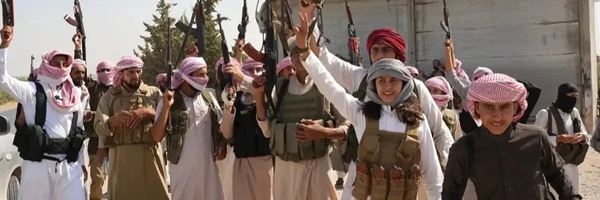Battle For Syria’s Oil Pits Local Tribal Forces Against US Occupation

Robert Inlakesh, MintPress News, August 9, 2024 —
In Syria’s Deir Ezzor province, Arab tribal forces have mounted a determined assault on the U.S.-backed Syrian Democratic Forces (SDF), aiming to reclaim their lands and challenge the U.S.’s de facto control over Syria’s oil-rich regions. The U.S. responded with missile strikes, underscoring the fragile hold Washington maintains over these critical resources, which have been central to its leverage in the ongoing Syrian conflict.
This escalation followed the arrest of Arab commander Abu Khawla by the SDF in August 2023 during an anti-Daesh (ISIS) operation in al-Hasakah. The arrest ignited over a month of armed clashes between Arab forces and the SDF, leading to the deaths of approximately 118 people, including ten civilians.
Ahmed al-Khubayl, widely known as Abu Khawla, was the leader of the Deir Ezzor Military Council, an entity formed by the Syrian Democratic Forces (SDF) in 2016 to combat Daesh and secure the areas around the al-Omar oil fields. These fields were later secured by U.S. forces, who established a military base nearby. The alliance between the SDF and the U.S. resulted in the de facto occupation of one-third of Syria’s territory, including 90% of its oil resources and most of its fertile agricultural lands.
Dana Stroul, the Deputy Assistant Secretary of Defense for the Middle East, openly acknowledged in 2019 that the U.S. occupation of Syria’s “resource-rich” areas, which she described as an “economic powerhouse,” provided Washington with significant leverage over the Syrian government in Damascus, including the ability to hinder reconstruction efforts.
When Abu Khawla, the emir of the Bakir tribe, was demoted and arrested from his position as commander of the Deir Ezzor Military Council, it sparked a significant backlash from his loyalists, who called for a siege on SDF headquarters demanding his release. Khawla was accused of recruiting around 1,000 private Arab tribal members outside the SDF ranks, a move that was seen by some as fueling sectarian tensions. This led to a flood of disinformation, further exacerbating the conflict.
As the situation escalated into September 2023, Sheikh Ibrahim Al-Hafel announced the formation of the “Arab Tribal Forces Army,” which allied with the Al-Uqaydat confederation, increasing pressure on both the U.S. and the SDF.
The armed offensive by Arab tribal forces initially focused on capturing territory in the Dheiban and al-Busayrah areas, east of the Euphrates River, previously under the control of the Syrian Democratic Forces (SDF). Ibrahim al-Hafel, commander of the Arab Tribal Forces Army, declared that his forces would “continue the fight against the SDF militants until the tribal areas are liberated,” asserting that the tribes “have the right to reclaim their lands.”
In response, the SDF mobilized a larger force from military sites to the north, backed by U.S. airstrikes from helicopters, to retake their overrun positions. The primary objective appeared to be the U.S.-held oil fields on the eastern side of the Euphrates River.
The SDF claimed that the National Defense Forces (NDF), loyal to the Syrian government in Damascus, provided artillery and mortar support to the Arab tribal forces during their offensive in al-Latwa, Abu Hamam, and Dheiban. The SDF statements also attempted to link the offensive to the Iranian Islamic Revolutionary Guard Corps, the Syrian government, and Hezbollah, likely to secure further U.S. backing for their counteroffensive. Although the NDF is loyal to Damascus, its members also belong to the Arab tribes in Deir Ezzor province, with reports of them crossing the Euphrates River to support the tribal forces last September.
The escalating conflict in Deir Ezzor threatens to unravel the U.S.’s strategic hold on Syria’s most resource-rich regions. As tribal forces push to reclaim control over these vital areas, the possibility of a broader insurgency against the U.S. occupation looms large. Should these efforts succeed, the recapture of Syria’s oil fields could drastically diminish Washington’s influence in the region, effectively crippling its leverage over the Syrian government and unraveling years of strategic efforts aimed at exerting pressure on Damascus through economic control. The U.S.’s ability to maintain its foothold in Syria now faces a critical test.
*
Robert Inlakesh is a political analyst, journalist and documentary filmmaker currently based in London, UK. He has reported from and lived in the occupied Palestinian territories and hosts the show ‘Palestine Files’. Director of ‘Steal of the Century: Trump’s Palestine-Israel Catastrophe’. Follow him on Twitter @falasteen47
